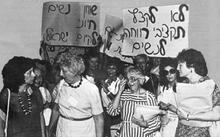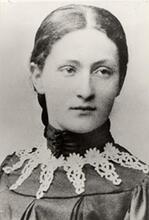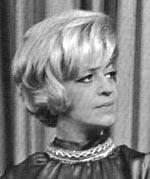Elsa Zylberstein
During the last two decades of the twentieth century, French cinema displayed an extraordinary wealth of young Jewish talents. Elsa Zylberstein's film career began with some minor roles but she won critical acclaim for the first time when appearing among extras on the set of the film Van Gogh (1991). She subsequently appeared in other biographies of famous Parisian painters at the beginning of the past century, playing their female models. Zylberstein achieved her first widely popular success in Mina Tannenbaum (1994). Zylberstein has also enjoyed a successful career in the theater, appearing in plays by Pirandello and Anouilh, and in adaptations of successful American playwrights. Additionally, Zylberstein has a strong humanitarian awareness, and she serves the French Senate as UNFPA goodwill ambassador.
During the last two decades of the twentieth century, French cinema displayed an extraordinary wealth of young Jewish talents. These personalities, unlike their predecessors, do not conceal their sense of belonging. For example, a romantic male lead of the 1930s had to alter his original family name from Salomons to the more French-sounding Jean-Pierre Aumont. Currently, film directors like Cedric Klapisch or Mathieu Kassowitz, script-writers like the couple Jean-Pierre Bacri and Agnes Jaoui, and actors like Emmanuel Salinger, Sandrine Kiberlain, Gad Elmaleh, and Elsa Zylberstein, do not refrain from divulging their cultural origins. In their work, they not only cling to their family patronyms but deal with diverse aspects of the Jewish condition in France today.
Early Life and Family
Elsa Zylberstein was born on October 16, 1969, to a well-off family. Her father, Albert Zylberstein, a reputed physicist, had survived World War II, together with his parents, because they had been hidden by people whom he later requested Yad Vashem to recognize as “Righteous among the Nations.” Her mother, Liliane, was a beautician for Dior. Zylberstein grew up with her younger brother in a residential area outside Paris. Their sense of Jewishness derived primarily from the annual attendance at the Liberal synagogue on The Day of Atonement, which falls on the 10th day of the Hebrew month of Tishrei and is devoted to prayer and fasting.Yom Kippur and the “gefilte fish” prepared by her Lithuanian paternal grandmother, who died in 1995. A visit to Israel in 1993 to attend a family wedding and the accompanying visit to Yad Vashem also made an impact on Elsa. To overcome what she called her “pathological shyness,” Elsa trained as a ballet dancer and took drama lessons while getting her French “baccalaureat” in the arts section.
Film Career
Zylberstein’s film career began with some minor roles, but she won critical acclaim for the first time when appearing among extras on the set of the film Van Gogh (1991). There, Zylberstein was singled out by the renowned director Maurice Pialat, who gave her the role of Cathie, the young prostitute with whom the tormented artist falls in love. It is no accident that she subsequently appeared in more biographies of famous Parisian painters at the beginning of the past century, playing their female models. Thus Zylberstein, with her radiant and classical beauty, her slender and aristocratic grace, was next cast in Lautrec (Roger Planchon, 1998). In that film, she played Suzanne Valadon, the model for Toulouse-Lautrec, Gauguin, and Renoir who became an appreciated painter under their influence and guidance. In 2003, she took the part of Modigliani’s lover and the source of inspiration for his famous “Jeanne” series of paintings, in Mick Davis’s eponymous film Modigliani, which also related the woman’s ttragic destiny. Jeanne Hébuterne had renounced the cozy life of her wealthy Christian family, who had disavowed her for living with a Jew who was an alcoholic bohemian and for bearing his child. After Modigliani’s untimely death, Jeanne committed suicide. While the critics were somewhat divided on the film’s artistic value, they unanimously praised Zylberstein’s compassionate and vibrant performance.
Yet Elsa Zylberstein had already achieved her first wide popular success some years before in Mina Tannenbaum (1994), by director Martine Dugowson. The film follows over twenty years the coming of age and ongoing friendship of two Jewish girls: Mina, the daughter of Holocaust survivors, and Ethel Benegui, from a Descendants of the Jews who lived in Spain and Portugal before the explusion of 1492; primarily Jews of N. Africa, Italy, the Middle East and the Balkans.Sephardim family. Zylberstein was rewarded with the coveted “Promising new woman actor” prize and her fruitful collaboration with Dugowson, a representative of the French new wave of female directors, continued in two more films: Portraits Chinois (Shadow Play, 1996) and Les Fantômes de Louba (Louba’s Ghosts, 2001). As the opening credits unfold to Shadow Play, we hear, in voice-over, former Israeli Prime Minister Yitzhak Rabin’s celebrated speech in praise of peace. In Louba’s Ghosts, Zylberstein is an abused and forsaken adolescent, who, obsessed by images of the Jewish past, later seeks revenge for her former humiliation.
Career Successes
Zylberstein often appears on the screen as the French incarnation of the so-called JAP, for example as Arlette Stein in XXL (Ariel Zeitoun, 1997), or as the modern revival of the romantic feminine type known in French literature as “the beautiful Jewess.” In L’Homme est une Femme comme les Autres (Man is a Woman, Jean-Jacques Silbermann, 1997) she plays the Orthodox Yiddish singer Rosalie Baumann, who falls in love with the wrong man, a gay clarinetist, under the spell of his Klezmer music. Since then, Zylberstein has lived with her partner in the film, Antoine de Caunes.
Appearing in more than three films a year, Zylberstein is one of the most sought-after young French actors. A versatile artist displaying the entire gamut of acting skills, she looks at ease in popular, run-of-the-mill productions as well as in more demanding, cinematically daring endeavors. For example, she was cast in three sophisticated roles by the Chilean-born director, Raul Ruiz, whose films are known for their surrealistic flavor and magic realism. In Ce Jour-là (That Day, 2003), shrouded in humorous poetry, she seems to move on the borderline between reality and dream. This ability to act almost on the verge of insanity without lapsing into melodrama, has also been noticed and appreciated by experimental directors like Chantal Akerman (from the so-called “Jewish-Belgian school of cinema”), for whom, with the same whimsical charm, Zylberstein played a mysterious poet in Demain on déménage (Tomorrow We Move, 2003).
Throughout, Elsa Zylberstein has also enjoyed a successful career in the theater, appearing in plays by Pirandello and Anouilh as well as in adaptations of successful American playwrights.
Humanitarian Work and Sensitive Demeanor
Elsa Zylberstein’s sometimes erratic on-screen demeanor is reserved solely for her profession. In her private, or more precisely civilian, life, she has steadily developed a humanitarian awareness and personal commitment that led to her appointment by the French Senate as UNFPA goodwill ambassador and spokesperson for a “Face to Face Campaign.” In connection with her mission of focusing on women’s welfare in Africa, particularly in the French-speaking regions of West and North Africa, Zylberstein spoke at the French Senate. There, she stated that “sexual and reproductive healthcare information is best passed from person to person, face to face. This is why it is necessary to support local organizations that are most aware of the population’s specific needs.” Elsa Zylberstein seeks to convince her own government that the financial help granted annually to developing countries should not be handled from state to state, but should directly support local associations involved in an unremitting struggle “to prevent women’s death when giving life.”
A fourth film directed by Martine Dugowson is entitled Les Yeux Baissés (With Lowered Eyes), the name given in the United States to Louba’s Ghosts in 2001. Dugowson says about her favorite woman actor, “She hides a treasure in herself: the capacity to be funny even when she sheds tears.” In various interviews about her profession, Zylberstein likes to quote the great French actor Louis Jouvet, “Talent is a passionate effort.” She also reveals that being an actor has helped her to explore her own sensitivity, to accept her own latent madness. Asked who is her favorite woman actor, she names Gena Rowlands, evoking her grace, strength, energy, and perceptiveness, qualities that perfectly define Zylberstein herself.
Positif 435 (May 1997). Special feature on young women actors.









